- Home
- Tricia Stringer
Heart of the Country Page 6
Heart of the Country Read online
Page 6
Septimus still didn’t move. The water had cleaned her up. All the mud and blood was gone; just the bruising remained. She might be lucky and not have permanent damage although the nose would never be straight again. Dressed in the men’s trousers and shirt she looked as if she could blow away in a breeze. He looked down at the tea by his feet then snapped his head up.
“They’re my clothes,” he snarled. “I was going to sell them.”
“They were out on the ground in a pile. I’m sorry about the filth, I …” Harriet’s voice trembled. “I’ve washed some and aired the rest.” She nodded to the trees behind the wagon where he could see the various shirts and trousers draped about.
“You can’t be here.”
“I might be able to repair my dress if you have needle and thread.”
“You can keep the clothes but you can’t stay.” He’d give up the shirt and trousers just to be rid of her.
“Where will I go?”
“I don’t care where you go. Head back that way.” He indicated the track his wagon wheels had made in the gaps between the large gums. “I’m not getting into trouble over you.”
Harriet sighed and bent to the fire. She poked at something on the edge and the delicious smell of hot bread reached his nose.
“Nobody knows I’m here,” she said. “Like you, they thought I was dead.”
Septimus scowled at her. There was no way he wanted this piece of damaged goods anywhere near him.
“I could help you,” she said.
He snorted. “I work alone.”
She walked towards him, each step placed carefully. She pressed a chunk of the hot bread into his hand. “I’m fourteen now.” Her tattered lips tugged up into a smile. “Today’s my birthday.”
He took a bite of the bread. It was good.
“Besides,” she said, “now we’re both running away from things we don’t want others to know about, aren’t we, Seth?”
He dropped the bread and was on her in an instant. He twisted her in front of him, bringing the knife up to her throat.
“I could just as easy slit your throat and drop you back in that pool,” he snarled in her ear. “If everyone thinks you’re already dead they won’t be looking for you.”
She went limp in his arms. “Killing me could be the best thing for both of us.”
Septimus held her a moment then thrust her away. She stumbled and moaned as she fell in the dirt. He picked up the bread and shoved the rest of it into his mouth, then sat down again. He chewed and kept one eye on her. The dough was soft and sweet, like Harriet had once been, far better than the damper he made himself. She slowly picked herself up. He took a slurp of the tea. It was strong and black, just the way he liked it.
“I can cook and keep things clean while you do your work.”
Her voice was soft but not weak. Whatever had happened to her she wasn’t giving in, despite her talk.
“I can be your woman like I was before.”
He shuddered. “Don’t talk,” he snapped. Bits of bread flew from his mouth.
Harriet gathered herself up and went back to the fire. She began to pack up the pots and utensils she’d used, along with his from the night before.
He watched her as she worked. Someone had done her over and there was no way he wanted to share his bed with her any more. He never wanted a woman who’d been used by other men again. He’d had no choice in the past and now it sickened him to think of women who’d bedded any other man, willingly or not. In spite of that, an idea was forming in his head. Maybe Harriet could be useful for a while. He could set up camp and leave her there while he went off selling his wares. She would heal with time and no one would see her. When the time was right he might be able to trade her at some isolated shepherd’s hut.
“As long as you cook and clean you can come with me.”
She turned her head towards him and opened her mouth but his glare silenced her.
“Never call me Seth again and don’t speak unless you’re asked. I don’t want anything else from you.” He stood up and flung the last of his tea at the fire. “Now get those things washed up. We need to get on the road.”
She watched him a moment through one puffy eye. Then she gave a slight nod and headed to the stream.
“Happy birthday, Harriet,” he said as he watched her pick her way to the water.
Nine
Thomas studied the rough structure in front of him. Last night he had finally made Penakie just as the light was leaving the sky. During his journey he’d got used to the bedroll, spread out in some soft soil or sandy ground, but he had been looking forward to the comforts of a proper bed and a roof over his head. A quick glance inside the homestead made him decide to stay with the bedroll one more night. Homestead was indeed a grand name for the hovel that was to be his home. The hope he’d held that a daylight inspection would reveal improvements he hadn’t been able to see in the moonlight was slipping away.
The roof was thatched with some kind of thin vegetation, not thoroughly by the look of it, and he could see no sign of a chimney. The walls were pine trunks barely taller than he was. They were ranged upright and in the daylight he could see gaps partly filled with mud.
He stooped through the space that served as an entrance. There was no actual door. After a minute his eyes adjusted to the gloom. The only furniture was a rough table, one chair and a long wooden shelf. Thomas assumed that was to be his bed. In the wall opposite the entrance was some kind of shutter. He pushed it out and sunlight poured in, revealing the motes of dust swirling in the air.
“Home, sweet home.” Thomas’s words hung in the air with the dust. He would have to do a lot of work on this place to turn it into a serviceable structure, let alone a home. He slumped to the hard wooden shelf, tipped his head against the wall and closed his eyes. He’d made it to Penakie, but now what? Overseer was a grand word but what did it mean? And where was the shepherd AJ had mentioned?
His eyes flew open at the bleating of sheep. He was getting to understand the ways of bullocks and had made some connection with his poor excuse for a horse but sheep were a new proposition. He jumped up from the plank and strode outside. There was work to be done. He’d come all this way and he had three thousand sheep to look after. Thomas couldn’t imagine that many all in one place. Nor could he imagine how AJ thought two men could manage such a flock. Still, his boss had been determined it could be done and Thomas was determined that he be the one to accomplish it.
By the end of the day, his behind once again aching from being jolted along by his horse, his earlier enthusiasm had ebbed away as he came to the full realisation of what he had taken on. The three thousand sheep might be there somewhere but they were not all in one place. The property was vast and everywhere he went there were small flocks. There was no sign of the shepherd, McKenzie. Thomas would need his help to keep the sheep together or there would be no hope of managing such large numbers. If he were to succeed he would need some kind of strategy.
He rode out each day, gradually his body accustoming itself to the saddle and the horse to him. Thomas had named the animal ‘Derriere’ in wry deference to his mother, who had always used the French word for buttocks. He didn’t think his derriere would ever recover from the experience, so he thought the name fitting. He treated the animal well and talked to it constantly, there being no one else but the sheep for company. The horse had no trouble with the rough terrain and was responsive to working with sheep. Thomas only hoped the animal could be restored to the good workhorse the auctioneer had said it had once been.
Each night he’d light a fire wherever he was, and dine on damper and the dried meat from his provisions. A rough map, scribbled with AJ’s notes and landmarks, was his bible as he explored each part of Penakie. One particular morning he studied the landmarks on the map and deduced he was quite close to McKenzie’s hut, though there’d still been no sign of AJ’s shepherd. Today Thomas planned to visit the hut. Their employer had said the man was unreliable.
Perhaps he was doing nothing while he thought there was no one to check on him.
Thomas had barely been in the saddle an hour when he saw a horse ahead of him. It was in the shade of a tree, head down. It was saddled but there was no sign of a rider. Thomas dismounted, tethered his own horse nearby and approached on foot. The horse lifted its head and shifted uneasily.
“Steady,” Thomas soothed.
The horse shook its head and stomped its foot. Thomas could see its reins tethered in the low branches of the tree.
The buzz of bush flies grew louder as Thomas got closer. He reached for the reins and ran his hand down the horse’s neck. It threw its head up and shifted its feet but appeared unable to move very far. A cloud of flies rose from its other side. Thomas ducked down to see what was holding the horse in place, then reeled back. No wonder the poor horse was agitated. There was a man lying on the ground, his leg tangled in the stirrup. Thomas had seen enough to know he was dead.
The horse shook its head again. Thomas pulled his collar up over his mouth and nose.
“Take it easy, boy,” he said.
He took the reins, which he could now see were tangled rather than tethered, and eased his way around the horse to a point where he could reach the stirrup. The horse tried to move away, shifting the body on the ground. Flies rose up then settled on the flesh. Thomas’s stomach turned. What a ghastly business. It took him some effort to get the foot out of the stirrup, but finally it fell to the ground. Thomas turned his back on the man a moment and led the horse away, talking to it as he went. He’d come through a small creek a short distance back, so he took the horse there and let it drink before tethering it. It had a bedroll, and saddlebags with food and a firearm packaged around the saddle. The rider had obviously been setting out somewhere. Thomas left the horse and went back to face the gruesome task of dealing with the body.
The man’s eyes bulged and his open mouth, a yawning gap in his thick beard, showed lips and tongue swollen and crawling with flies. There was a wound across his forehead and congealed blood matted his orange hair. The leg that Thomas had extricated from the stirrup was twisted almost back to front. The horse had dragged the man a distance by the look of the tracks. Thomas followed them across open ground to some thicker trees. There the tracks stopped. Not far above his head a thick branch jutted out. He could only assume the rider had connected with that and been knocked from his horse to be dragged to where Thomas had found him.
By the colour of his hair and the greasy clothes, Thomas was guessing he was AJ’s shepherd, McKenzie. Whoever he was, he needed to be buried without delay. He was already starting to smell. Thomas mounted Derriere and went on to find the shepherd’s hut.
He passed through the trees and around the dangerous bough and continued along a low ridge until he found the hut on a flat area a hundred feet or so beyond. A gust of wind swirled the ash from the dead fire into his eyes as he climbed down from his horse. The hut looked even rougher than his own; it was hardly more than a box with a sloped roof of bush and sticks. He poked his head in the open space that passed as a door. As he had expected there was no one-there. He found a shovel by the fire and headed back to McKenzie.
It took him half a day to dig a hole he deemed deep enough. He covered the body and marked the grave with three large rocks. He had no idea if McKenzie had family or anyone who would mourn his loss. Thomas looked down at his work and said a prayer. The sun was getting low in the sky by the time he’d tidied up around the hut. He collected the few items of food that he had room to carry. The rest would have to wait. McKenzie appeared to have had few personal effects. Thomas would have to get word to AJ to see what should be done.
Two days later, with the sun once again low in the sky, he reached his homestead. It hadn’t improved any with his absence. Thomas was tired and hungry, and more than that, McKenzie’s death weighed heavily on him. Nevertheless he dismounted and took stock: there was no help for it but to keep going.
First he dealt with the horses. McKenzie’s had been useful to carry extras. Earlier in the day Thomas had found a young sheep trapped in a waterless stream bed, tangled in a clump of tree roots. Its leg had been broken so he’d put it out of its misery. He’d made sure he recorded it in the little book he kept so that he could report everything to AJ.
Now he made a fire in the crude stone setting at the back of the hut. He dragged the table out and cut up the sheep. While the meat roasted he pondered his predicament. How was he to manage without a shepherd? AJ had an enormous flock, though by Thomas’s count they were a few short. He was determined not to lose any more.
He studied the map in the light from the fire and re-read the notes he’d added. What he’d noticed about Penakie was that, even though it was a vast area, there were stretches of land with low vegetation bounded by the long arms of ridges rolling down from a band of hills. It was in these natural paddocks, not far from the trickles of water that flowed in the streams, that he’d found larger numbers of sheep gathered. The sheep were a mix of old and young, some in better condition than others.
The first thing he needed to do was sort them. If he could break them into three flocks it would be a start. On the flat between the house and the stream was a small yard built from roughly hacked timber. He put the horses in there at night. It was the only other structure here besides the hut and far too small for what he had in mind. He needed a large drafting yard for this many sheep.
With a belly full of meat and a plan forming in his head, Thomas crawled into his bedroll and let sleep claim him.
The next morning, Thomas woke refreshed and keen to map out his plan for a yard. The sight of his camp in the early light made him stop. He had another problem: his stores and water. He hadn’t unpacked many provisions from the dray because there was nowhere to put them. There was plenty of water in the stream but it was quite a walk from the hut, and AJ had warned him the pleasant spring weather would quickly turn to heat. In the gentle light of the morning, with a breeze almost cold across his shoulders, Thomas took a gulp of tea and tried to imagine the heat AJ had alluded to. Thomas hadn’t experienced summer in Australia but his employer had. It would be prudent to heed his advice and be prepared.
A bird warbled loudly from a nearby tree and another answered. The breeze swirled and blew ash from his fire into the open barrel he used to store water. Thomas rose from his squat, looked around again at his crude home and made a decision. The sheep work would have to wait a few days. If he didn’t make good his living conditions there’d be no one to look after the animals anyway.
The thought made him hesitate. He’d felt a pang of loneliness the night after he left Bert and the other teamsters. He’d enjoyed sitting around the fire listening to their yarns. On the track to Penakie he’d come across a couple more small eating houses and had spoken to people there, but he’d been in his new home a week and not once had he felt lonely. Now the thought of his isolation engulfed him. This property was supposed to be the furthest from Adelaide of any in the colony. He hadn’t even seen any sign of the natives who were supposed to inhabit the place. McKenzie’s death weighed heavily on him. What if Thomas took sick? He could die out here like the shepherd and no one would know until AJ checked up on him in a year.
The bird warbled again and the sun, rising quickly now, was warm on his back. Thomas turned to the hut. His survival and that of the sheep depended on him alone. There was no time to be idle. He pushed the melancholy thoughts from his head and set to work.
Ten
Several days later, as he trimmed the last of the meat from the sheep carcass for a stew, Thomas pondered his progress. The hut was filled with his provisions stacked on shelves or hung on hooks. Coming back from the stream one morning he had discovered a small furry animal with a long tail hovering on the threshold. He had immediately set too and made a door that would close and hopefully keep such creatures out.
Down at the stream he had made a rough apparatus to enable him to fill multiple water bar
rels, rather than the one bucket at a time he’d been carrying up to the hut. A fork-like structure sat in the stream, which supported the barrel on its side to capture the water. A rope thrown over the bough of a tree and wrapped around the barrel levered it up enough for him to fix its lid in place. Once the barrels were full he rolled them up to the dray, using the natural slope of the bank, some saplings and more rope. Then he transported them to the hut, where he stored them outside against a wall with their lids still on to keep out the dirt.
He’d even built a proper fireplace with a chimney, found a large tree trunk to use as a preparation block rather than the table, and dragged a log close to form a rough bench. Over in the trees, a little way from where he’d hung the sheep carcass, he’d created a hammock for his bedroll like those he’d seen on the boat journey. He hadn’t left himself much room inside the hut and found he’d got used to sleeping outside, although he wasn’t sure how much protection the trees would give if it rained. They had strange trunks with lots of rough bark that changed colour from grey to deep orange depending on the light. The leaves were thick at the top and gave good shade but how well they’d repel water, he’d yet to find out.
He looked up at the vivid blue sky. He still had no idea what to expect of the weather. The sky since he’d arrived at Penakie had been clear with only the occasional clump of white cloud but he’d noticed heavy clouds forming over the distant ranges that morning. They looked quite dark now though still a long way off.
He scraped a last sliver of raw meat from the bone and threw it off to the side, then watched as the black and white bird that had been lingering nearby made several quick hops, snapped up the meat and flew to a nearby tree. As Thomas had toiled around the hut over the last few days, he had discovered it was the bird that made the warbling sounds. He’d also found it liked meat. Yesterday it had hopped closer and closer until it dived on a scrap he’d dropped.

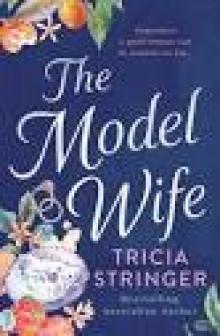 The Model Wife
The Model Wife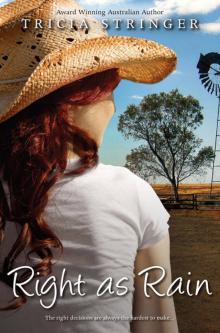 Right As Rain
Right As Rain Something in the Wine
Something in the Wine Between the Vines
Between the Vines Dust on the Horizon
Dust on the Horizon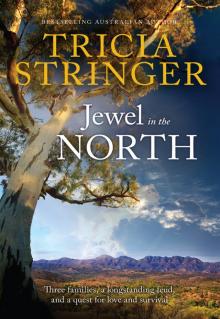 Jewel In the North
Jewel In the North Riverboat Point
Riverboat Point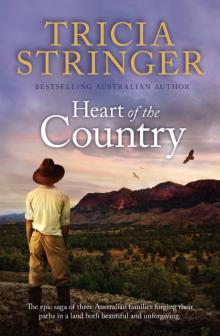 Heart of the Country
Heart of the Country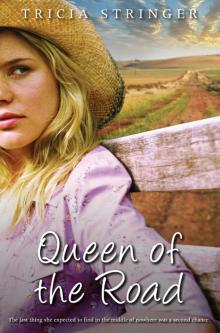 Queen of the Road
Queen of the Road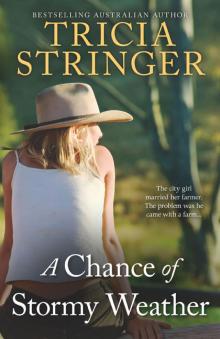 A Chance of Stormy Weather
A Chance of Stormy Weather Table For Eight
Table For Eight